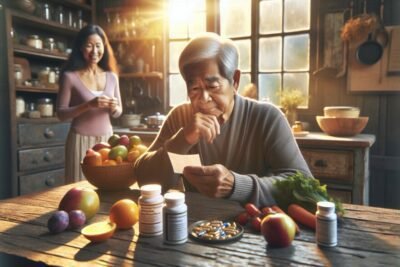
Overcoming the Sugar Rush: Quick Actions for Lower Blood Glucose

- Overcoming the Sugar Rush: Quick Actions for Lower Blood Glucose
- Understanding the Sugar Spike: Why Does It Matter?
- The Immediate Response: Quick Actions Post Sugar Indulgence
- Long-Term Strategies to Maintain Healthy Blood Glucose Levels
- Natural Supplements and Their Role in Blood Sugar Regulation
- Consequences of Neglect: The Impacts of High Blood Sugar
- Conclusion
Overcoming the Sugar Rush: Quick Actions for Lower Blood Glucose
With rising awareness about health and nutrition, it's no wonder that blood glucose levels have become a topic of prime concern. The sugar rush we occasionally indulge in may give a temporary high, but the long-term consequences can be severe if not addressed promptly. In this comprehensive guide, we explore the steps to effectively combat elevated blood glucose levels, ensuring your overall wellbeing.
Understanding the Sugar Spike: Why Does It Matter?
Blood glucose, commonly known as blood sugar, is derived from the foods we consume. Whenever we indulge in sugar-rich foods or carbohydrates, the body experiences a rapid increase in blood sugar levels. While this might sound harmless, consistent spikes can lead to conditions like type 2 diabetes, heart disease, and even stroke.
The Immediate Response: Quick Actions Post Sugar Indulgence
- Stay Hydrated: Drinking water can help in flushing out the excess sugar through urine. Keeping hydrated ensures that the kidneys get the necessary support to remove the excess glucose.
- Engage in Physical Activity: A brisk walk or a short workout session can work wonders. Physical activity triggers muscles to use sugar for energy, consequently bringing down elevated levels.
- Consume Foods with Low Glycemic Index (GI): Foods like oats, barley, and beans have a lower GI. Incorporating these into your diet can moderate blood sugar levels.
- Limit Your Sugar Intake: This might sound obvious, but sometimes we unconsciously consume hidden sugars in processed foods. Always check the nutrition label and opt for sugar-free alternatives when possible.
Long-Term Strategies to Maintain Healthy Blood Glucose Levels
- Regular Monitoring: It's essential to keep a tab on your blood sugar levels. Regular checks, especially if you're at risk, can help in early detection and intervention.
- Balanced Diet: Prioritize whole grains, lean proteins, and plenty of fruits and vegetables. Limiting refined sugars and processed foods is crucial.
- Maintain a Healthy Weight: Being overweight can increase the risk of type 2 diabetes. Engaging in regular exercise and monitoring calorie intake can help achieve and maintain a healthy weight.
- Stay Informed: Knowledge is power. Being updated about the latest research, remedies, and nutritional advice can keep you a step ahead.
Natural Supplements and Their Role in Blood Sugar Regulation
Natural supplements like cinnamon, fenugreek, and berberine have shown promising results in regulating blood sugar. However, always consult with a healthcare professional before integrating them into your routine.
Consequences of Neglect: The Impacts of High Blood Sugar
Prolonged high blood sugar can lead to:
- Neuropathy: Damage to the nerves, especially in the legs and feet.
- Retinopathy: Eye damage which can culminate in blindness.
- Kidney Disease: High sugar levels can damage the kidneys over time, leading to dialysis or transplantation.
Conclusion
In our fast-paced world, it's easy to gravitate towards quick fixes and instant energy sources like sugar. However, the repercussions of a consistent high sugar diet can be daunting. By implementing the strategies we've highlighted, not only can you combat the occasional sugar spike but also lay down a foundation for long-term health and vitality. https://diabetescurenow.com/








